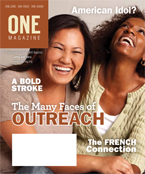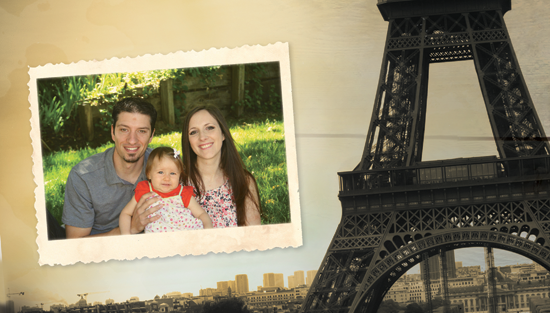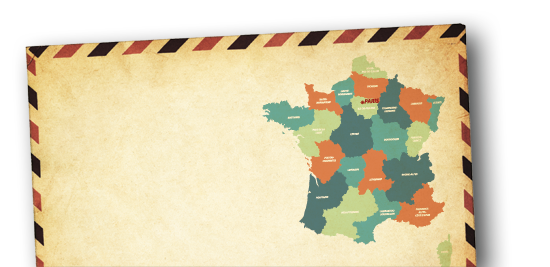
April-May 2013
The Many Faces
of Outreach
------------------
|

The French Connection
by Deborah St. Lawrence
Joel (a missionary kid) and Lydie (a French national) Teague are currently raising prayer and financial support to begin their ministry in France. I recently talked with them to discover how they made the transition from career-oriented professionals to missionaries.
Joel and Lydie: Quick Facts
Married: June 2008
Children: Eva, February 2011,
another daughter is due May 2013
Appointed to Missionary Service: December 2011
Deborah: Joel, your parents are missionaries to France. Were you born there?
Joel: No, I was born in California. My parents were ministering there at the time.
Deborah: So, how old were you when you first went to France?
Joel: About five and a half.
Deborah: Do you remember your impressions of the change from living in America to living in France?
Joel: I was young, and the way I felt didn’t necessarily reflect the way things were. I thought the kids in France were mean, especially the boys. I’d left a small town with lots of Christians and friends and moved to Nantes, the sixth largest city in France. I didn’t speak the language or understand the culture.
Deborah: Tell me about some of the pros and cons of growing up as a missionary kid (MK) in France.
Joel: One of the big negatives for me was being separated from family—grandparents, cousins, uncles, and aunts. I felt distant, hardly knowing them after a few years. Also, being separated from my country and culture was hard. I had no Christian friends, no youth group. Although, maybe one of the reasons I’m so passionate about youth in France is because I didn’t have that opportunity for fellowship myself.
Deborah: On the positive side?
Joel: In my opinion, growing up in another country gives you a more open mind. You have a better idea of what’s going on in the world; it changes your worldview. You gain cross-cultural experience that’s beneficial. Meeting Christians from other countries helps you realize that different people worship God in different ways. I think maybe it’s easier to accept people for who they are.

Deborah: Growing up as an MK, did you ever think you’d become a missionary?
Joel: No. I really wasn’t interested in that at all.
Deborah: What changed your mind?
Joel: God, over time. He spoke in many ways, especially music lyrics and Bible verses. Matthew 16:26 and a song based on that verse really helped me realize my priorities weren’t right. I was more concerned about the priorities of this world than His priorities. Since I was a kid, I wanted to get a degree and a good job. Romans 12:2 helped me realize obtaining a good job, nice house, and decent car were ways I was conforming to the world rather than following God’s leading. On top of that were examples of different people in the Bible who gave up everything to follow Jesus.
Deborah: Could each of you summarize your spiritual journey for me? Joel, will you start?
Joel: God was always part of my life. I don’t remember a time when I didn’t believe in God. When I was eight, I listened as my mother explained salvation to my older brother and led him to the Lord. A little later, I told my parents I wanted to have my sins forgiven and go to heaven, too. And, they led me to the Lord. Obviously, at that age you don’t understand everything, but I knew I wanted Jesus in my heart.
At first, it didn’t really seem to have a huge influence in my life. But as I grew older, I started to realize that being a Christian was much more than believing in God and going to church. I had no Christian friends, and I think it made me more aware of my need for the Holy Spirit to transform me. I also attended several youth events in Germany with powerful worship and engaging sermons that encouraged me to take my faith seriously.
Lydie: When I was 16, I went to the Saint Nazaire Church’s youth group. I was touched by the kindness of the people and the joy they had. Jerry Gibbs led this youth group, and he asked us all, “Who is sure you are going to heaven?” I didn’t raise my hand, so he talked to me about Jesus later. I was moved by the love Jerry Gibbs had for the unsaved like me. That’s why I kept attending youth group and then later Sunday services. I didn’t really “get” the gospel until I went to the St. Nazaire church. About two years later, I accepted Jesus as Savior, and He really changed my life.
Deborah: You were both Christian teens in different churches. When did you get to know each other?
Joel: There’s a big youth event in Germany each year. I went three years as a participant and then three other years as a volunteer to help out. In 2003, Lydie and I both went as volunteers. To save money, several churches shared vehicles for the trip. Lydie and I ended up in the same van. Although we’d seen each other before, we hadn’t talked and didn’t really know each other.
Lydie: Joel and I talked a lot on the trip. I was a new believer. He helped me realize the importance of living different, that sharing the gospel should be every Christian’s goal. I knew from the beginning, that I didn’t want to be a Sunday Christian, and our talks helped me know how to be the Christian I wanted to be.
Deborah: Did you start dating after the trip to Germany?
Lydie: No. It was several years later before we dated.
Deborah: Lydie, what was it like, being a French Christian?
Lydie: I never met another Christian in school in my whole life…all through high school and college, no other Christians. Most of the time, this is the experience for Christian young people in French churches. They usually have no other Christians unless it is a sister or brother. We hope this is going to change. In some areas of France, there are a few more Christians, but not in our area. Nantes has one of the lowest percentages of Christians in France, maybe 0.2%.
Deborah: Before you decided to pursue missions full-time, tell me what daily life was like in France.
Joel: I earned a Master's degree in computer programming and worked as a software engineer for six years. I liked the work, but it involved a lot of hours. I also served in our church in St. Sebastien. I set up the church website and took care of graphic design for the church and JCrois, an annual youth event my dad initiated. I continue to be involved in coordinating JCrois. I’m a member of the worship team, where I play drums and guitar, and I also serve on the church leadership council. Lydie and I both work with the youth.
Lydie: I was a legal advisor for an insurance company. I have a Masters degree in law, and initially, I planned to be an attorney but decided not to pursue that.
Deborah: Why did you decide not to pursue law?
Lydie: I worked part-time in a law office for about a year. During that time, I worked on a case where I had to defend a man who wanted to keep custody of his kids. I knew he wasn’t a good father, but my job was to help him. I realized it would be extremely difficult to live with integrity and be a lawyer in France. I also saw the hours required, and I would have had no family life for several years. No time for ministry. I lead small discussion groups that help people wrestle with tough questions like “If God is good, then why…” I use the Bible to lead them to understand and come to Christ. Continuing on the law path meant no time to share the gospel with unbelievers.
Deborah: We’ve established that you both had good jobs, good careers. So, why did you decide to become missionaries?
Lydie: God just really touched our hearts. We felt overwhelmed by the lost people around us. At least 99% of the people around us didn’t know God.
We felt overwhelmed by the lost people around us. At least 99% of the people around us didn’t know God.
Joel: We were spending so many hours in things that were going to fly away, be worthless. France has such incredible need—so few churches, so few Christians. We’d do JCrois and people would get saved, and then we would go back to our jobs and wonder what we were doing there. It didn’t make sense. People needed to hear the gospel. Once they heard it, they needed discipleship, while we went back to our jobs.
Deborah: So, you decided you wanted to minister full time. Why as missionaries?
Joel: We wanted to serve with Free Will Baptists. The work we were already doing was with Free Will Baptist people, projects, and churches. If our church in France could hire us to do ministry full time, we would have done that, but they can’t even pay our pastor.
Deborah: What do you plan to do when you return to France? What will be the focus of your ministry?
Joel: We’ll continue JCrois events. JCrois takes place over a weekend. The Sunday morning service is for unchurched people, and we try to make everything clear with the gospel and the invitation. People have always been saved during that time. In 2011, 10 people were saved. In our context, that seems like a miracle!
While we can’t do the three-day event more often, we can do what people here in America might call seeker services geared specifically for people to bring unchurched friends to hear a clear presentation of the gospel.
You can have the best preaching, music, etc. in church services, but people in France won’t come. They are suspicious of church. So we want to reach out to young adults, people 30 and younger, and find a way to meet them. We want to invite them to other events in and out of the church building. Trust is low; we have to build relationships first. We want to use music, sports, art—anything to give us an opportunity to meet them and invite them to small group discussions and Bible studies, etc.
It’s easy for new believers in France to turn away from God or have a worldly lifestyle. Lydie and I have a passion for discipling new believers, helping them to solidify their understanding of Scripture and their responsibility to share the gospel with others.
Deborah: Joel, having grown up in France, do you see you and Lydie as having an advantage over other young missionaries who go to France?
Joel: I think we have both advantages and disadvantages. On the advantage side, we don’t have to learn the language and the culture. We “get” things that people who haven’t grown up there won’t. Here in the States, Lydie often misses colloquial humor or pop culture references. We don’t have that problem in France.
We also have a network of people with whom we already have relationships. No one can tell I’m not French unless I tell them. The French media says our church is a cult from America; being immersed in the culture helps erase some of those stereotypes.
I want to make sure people know how much we appreciate and honor pioneer missionaries. Without them, we couldn’t be second-generation missionaries. We have the opportunity to build on what they started years ago.
Deborah: Disadvantages?
Joel: Unfortunately, there is no Free Will Baptist official training or Bible college available in France or in French. We had to do our classes online in English from France, which was not easy, especially for Lydie. We haven’t had the opportunity to go to a Bible college, which would be a huge blessing. Another disadvantage is the fact that we do not have a home church in the United States, and we don’t know very many people throughout the country. This is definitely a disadvantage when raising funds.
Deborah: What’s the one thing you want people to know about you and your ministry?
Joel: Missions is teamwork. Everything people do in prayer or financially makes an eternal impact in people’s lives. Lydie is a good example of this. Her salvation is a direct result of people sending missionaries to France.
Lydie: We can see signs that God is preparing to do something among the young people in France. They are way more open to the gospel than their parents. Some people say there’s an awakening coming, and it is my dream to see this happen.
About the Writer: Deborah St. Lawrence is director of communications for Free Will Baptist International Missions.
More About JCrois
Government leaders, academia, and media push French youth toward a godless society.
JCrois, French for “I Believe It,” is an annual youth conference designed to encourage Christian young people in their faith, give them the tools to defend what they believe, and create opportunities to evangelize friends.
Each year, Christian teens throughout Brittany attend the conference to hear influential speakers, participate in training seminars, and fellowship with other Christians who share their struggle to live out their faith. As they learn how to defend their faith, they are equipped to share what they learn with others.

Dennis Teague recruited a team from America to help put on the first event in 2003. They did all the speaking and worship music. Joel Teague says, “Dad’s a visionary. He comes up with ideas and finds ways and people to make it happen. I thought that was crazy, but he was right.”
Since the first year, French Christians have worked beside missionaries to plan and provide the annual event. Workshops about sharing the gospel end with young people taking it to the streets, engaging strangers, and putting what they’ve learned in to action.
“Learning by doing is one of the basic principles of the conference,” Dennis says. “We intentionally unite training and ministry, believing the best way to learn the skills of ministry is by doing ministry.” As a result, confidence is strengthened and local churches benefit from newly honed skills.
JCrois will celebrate its tenth anniversary October 2013. The original American team has been invited to return and participate.
JCrois Themes
2003—The Bible is Reliable
2004—Creation vs. Evolution
2005—Making Ethical Decisions
2006—World Religions
2007—Dare to Talk About Jesus
2008—If God Exists, Why…?
2009—Decoding the Pop Culture
2010—Be a Hardcore Disciple
2011—Living for Eternal Objectives
|
|

